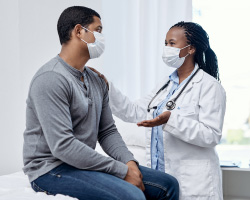
June 20, 2022—You may have heard about monkeypox in the news or online. Although some cases have been reported in the U.S., there's no need for alarm. Here are some facts that can help you keep this outbreak in perspective.
What is monkeypox?
Monkeypox is a rare virus that often causes rash or sores, as well as flu-like symptoms. However, most infections are mild, and monkeypox does not spread easily between people unless they've had close contact. The Centers for Disease Control and Prevention (CDC) says the threat of monkeypox for people in the U.S. is low.
How does it spread?
Monkeypox is spread to a person through infected people or animals. CDC says person-to-person infection can occur if a person has contact with:
- Monkeypox sores, scabs or rash.
- Sheets, clothes, towels and other items used by someone who has monkeypox.
- Respiratory droplets or oral fluids from a person with monkeypox.
That contact could happen if you live with a person who has the virus. It can also spread during contact such as hugging, kissing and sex. Another risk factor is contact with a dead or alive wild or exotic animal from Africa. You should also keep an eye out for symptoms if you have traveled outside the country to a place with confirmed cases of monkeypox.
What symptoms should I watch for?
The CDC lists these common symptoms of monkeypox. Most are similar to flu symptoms.
- Fever.
- Headache.
- Muscle aches and pain.
- Back pain.
- Swollen lymph nodes.
- Chills.
- Exhaustion.
- The appearance of a rash 1 to 3 days after the fever, usually starting on the face.
How serious is monkeypox?
According to the World Health Organization, most people with monkeypox recover on their own. The illness usually lasts for 2 to 4 weeks. In some cases, antiviral medicines can help.
How can I keep myself safe?
Remember, monkeypox is rare and the threat is low. There are a few ways that you can try to protect yourself against monkeypox.
- Avoid close contact with people who have monkeypox symptoms. That includes face-to-face contact, touching and sex.
- Practice handwashing with soap and water after contact with sick animals or humans.
- Avoid contact with animals or any materials that may have exposure to monkeypox.
If you think you might have monkeypox or if someone close to you has it, let your healthcare provider know. They can help get the care you need—and avoid spreading the virus to others.